Against the backdrop of cumbia music playing over a speaker, kids running around with Silly String, old men playing dominoes and the influx of visitors from the nighttime rush, I walked through Corona Plaza for the first time since its reopening. The energy at the street food market was infectious.
Closed by sanitation and police officers in July 2023, the long-celebrated market reopened in December on a smaller scale from its original 80 vendors. Authorities cited lack of permits and sanitation protocols as the reason for the vendors’ eviction. The city has capped the number of food vendor permits it gives out at 5,100 for decades, without adjusting to account for population increases. The two organizations, Street Vendor Project and La Asociación de Vendedores Ambulantes, led the movement for the vending area, whose stalls are run primarily by immigrant women who live in Corona, to be reopened.
Despite the commute from the East Village, Corona Plaza is a worthy trip for any NYU student wanting to support small businesses and longing for authentic flavors from Mexico, Ecuador and Guatemala at affordable prices. Here are five vendors every foodie should visit.
Chalupas Las Comadres
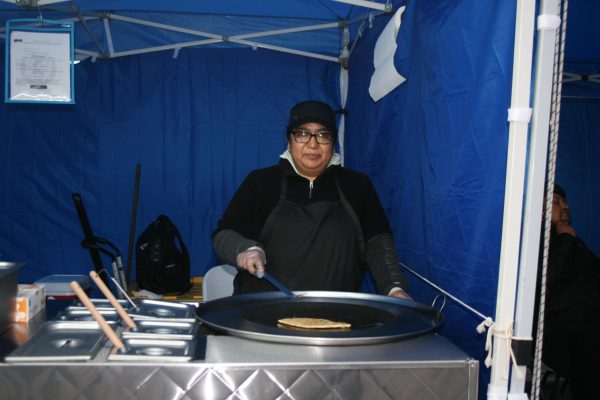
Chalupas Las Comadres serves up chalupas, tlacoyos and savory treats in Poblana style, a cuisine from Puebla, Mexico. During my visit, I opted for the tlacoyo — the toasted corn masa, crisp off the comal and loaded with toppings. There was a little too much lettuce for my liking, but the cheese and cream were a nice touch. The tlacoyo reminded me a little of pupusas revueltas, a Salvadoran dish consisting of stuffed masa cakes, and is also considered a cousin of Mexican huarache and sope.
“My inspiration was that my husband was without work, and I knew how to cook this back in Mexico,” Joaquina, the owner of the stand said.
Originally from Puebla, Joaquina has lived in New York for 16 years and operated her business for three.
“I didn’t work because we were fighting for them to give us permission to be able to work here in the Plaza,” Joaquina said about the market’s monthslong closure. “Then we went to the City Hall protests. The city gave us 14 stands for now.”
Joaquina said her favorite part of vending in Corona Plaza is the diversity among visitors.
“People come from the Bronx, Long Island, Philadelphia, Los Angeles,” Joaquina said.
Lupita Quesadillas
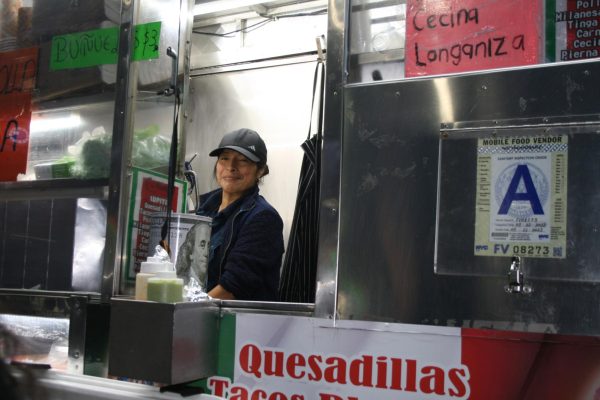
At Lupita Quesadillas, I ordered one quesadilla and one taco. The sizzling meat on the grill filled the air with a savory aroma, teasing my taste buds, while the crispy tortilla and fresh veggies provided a satisfying crunch that complemented the tender meat. I was glad I opted for onions and cilantro, which added a depth of freshness.
“Before, a lot of people would come that knew Corona Plaza,” Guadalupe, the owner of the stand said. “The people don’t come anymore like they did before. Now, very few people come.”
A yet-to-be-named Guatemalan cuisine vendor
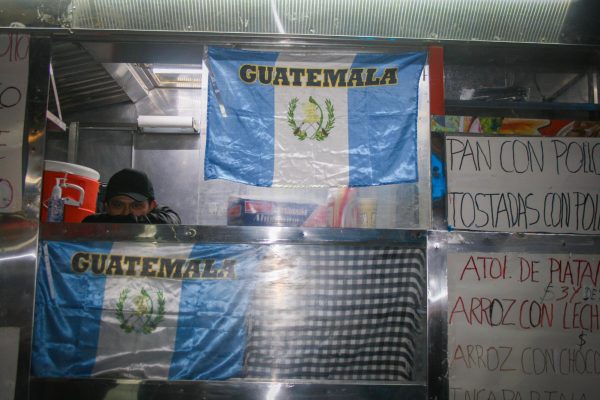
Directly under the roar of the subway track is one of Corona Plaza’s newest stands — a Guatemalan cart without an official name. I tried a chicken tamale, which had a soft texture and was perfect for the cold weather. As I pulled back the corn husk wrapping, steam emanated out, releasing a comforting aroma. Moises, the stand’s owner, also sells arroz con chocolate, chicken and pork tamales and atol de platano.
Moises, who opened his stall just two months ago, is a man of few words but strong flavors. His reason for starting a business: “for work.”
Ricos Elotes
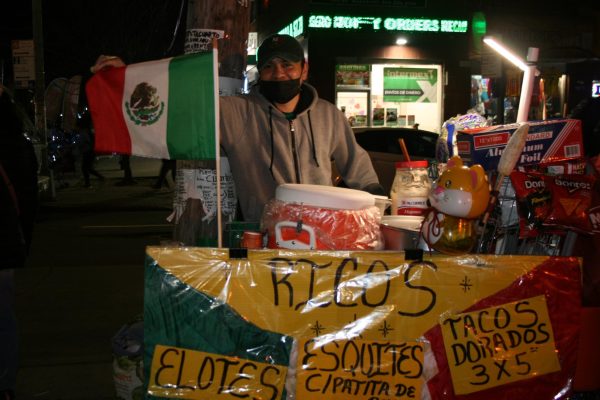
The Doritos esquites at Ricos Elotes were my favorite snack of the trip. As someone who has always loved elotes, Mexican roasted corn on the cob, and esquites, roasted corn off the cob, the dish was a game changer. Served in a Doritos bag, a scoop of corn was added with cheese, mayo, hot sauce and lime squeezed fresh on the spot. Under the weight of the toppings, the Doritos retained a delicate crunch, neither soggy nor too crispy. I loved all the different textures and flavors, as well as how portable my snack was.
“I’ve always liked to sell, and the people like what I sell. The esquites are what sell the most,” Renee, the owner of Ricos Elotes said. “The dori-esquites, the elotes, it’s what there is in Mexico. It’s what we call an ‘antojito [snacks] Mexicano.’”
Renee has lived in New York City for two and half years and has worked a year and a half at Corona Plaza. Although he initially began working as a cleaner in the city, sparse cleaning opportunities led him to start selling elotes as he did in Mexico.
PinchChoclo
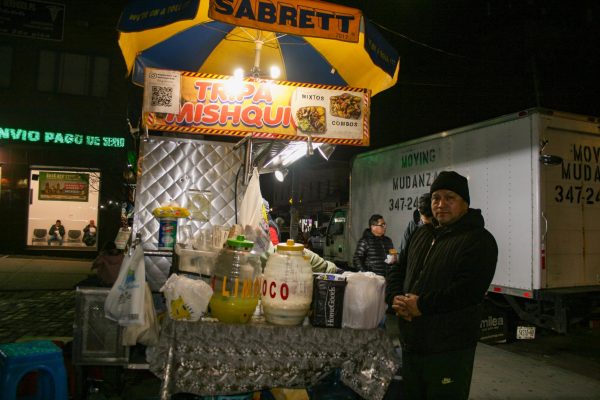
Our last stop on our tour was PinchChoclo, and its lemonade made me feel like I left the best stand. With my Dorito esquites from Ricos Elotes in hand, I was greeted by the owner of PinchChoclo, Patricio, telling me, “Buen provecho,” the Spanish equivalent of “bon appetit.” Having lived in New York City for 26 years, Patricio stressed the importance of not forgetting his Ecuadorian roots.
“I like to be social with a lot of people,” he said. “In a place far away from where we’re from, we get to have friends and customers from countries around the world.”
After contemplating between the lemonade and coconut water, I decided on the lemonade and chatted with Patricio while he served it in a huge cup. With real lime soaked in, the drink had a balanced freshness I didn’t even know I needed in the winter months.
“Sigue adelante, keep going,” Patricio said. “If you have any project, do it well. And show that Hispanic people have intellectual capacity too. We also have professions in our countries, but when we immigrate to this country we have to look for work options since we don’t have the opportunity to get the same here.”
Contact Carina Christo at [email protected].






















































































































































